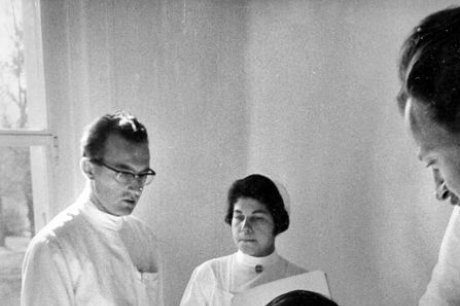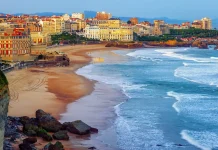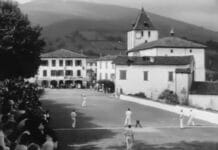This article was translated by John R. Bopp
He was born in Bilbao in 1911: Julián de Ajuriaguerra, a man who, without a doubt, is part of that pantheon of illustrious Basques of the 20th century but who, unfortunately remains largely in the shadows, without his due recognition from Basque society.
These days, we’ve been talking about another great Basque of the 20th century: Balenciaga who, as an haute-couture designer, has achieved well-deserved universal recognition and even a museum in his hometown of Getaria. On the other hand, if we asked on any Basque street outside perhaps Otxandio (where his family was from) about Julián de Ajuriaguerra, it’s most likely almost nobody would know anything about him (including us); or, if we’re lucky, we’d be “corrected”: “Julián” Ajuriaguerra? No, you’re mistaken, it’s not Julián, it’s Juan de Ajuriaguerra (the leader, in hiding, of the Basque Nationalist Party during the Franco dictatorship, and Julián’s older brother). But no, Julián de Ajuriaguerra is a role model in psychiatry and a researcher who radically changed the way humanity faces psychiatric problems.
This scientist and humanist defined himself as a “Peninsular Basque”. He was a fighter against Franco, who left the comfort of Paris, where he practiced medicine, to fight against Franco in Catalonia. After that, he joined the French Resistance to fight Nazism. He was a man of strong convictions, and although he was never a militant member of a party, he always felt great admiration for his brother Juan, and, as we said before, he called himself a “Peninsular Basque”.
For all of that, we believe the Sud-Ouest is mistaken when they say he was “more anarchist than nationalist”. He was a free spirit who didn’t want to be tied to any one specific way of seeing the world. But when he walked out of the Bayonne room where, in 1984, Mitterand was giving a speech, he didn’t do so because he opposed the system, but rather because Mitterand had refused to create a Basque départment that would encompass all of the French Basque Country. That is not the behavior of an anarchist. It is the behavior of a Basque nationalist, even if he did not want to belong to a political party.
Eusko Ikaskuntza has prepared a homage to this extraordinary man, which will be held today, June 10, in Bilbao, and tomorrow, June 11, in Bayonne. At this homage, a documentary about his life will be shown, and we’re dying to see it.
To speak of him and to join in on this homage, we’re breaking our normal rule (what else are rules for if not for breaking?) to not reference Basque newspapers in our entries, because even though we want to find out what the rest of the world is saying about the Basques, this is a special occasion. A person of such great intellect and humanity as Julián de Ajuriaguerra deserves that exception. So, we’re adding in our two cents to this homage, and doing what we can to help spread the knowledge of this Man, yes, with a capital M, who belongs to that extraordinary generation of Basques who lost their youth to the Spanish Civil War and who showed us how it’s possible to be nationalist, solidary, Basque, universal, democrat, pacifist, and an unstoppable defender of Freedom, all at the same time.
Sud Ouest – 8/6/2011 – France
Tête chercheuse


Julian de Ajuriaguerra ne rentre dans aucune case. Chercheur éclectique, neuropsychiatre, pionnier dans le développement de la psychomotricité et de l’orthophonie, précurseur du mouvement des sciences cognitives, ce médecin basque était aussi un proche des surréalistes, un intellectuel avide de connaissance et un esprit libre. Le Collège de France, où il fut titulaire d’une chaire de Neuropsychologie du développement de 1976 à 1980, lui a rendu hommage en début d’année, pour le centenaire de sa naissance, le 7 janvier 1911. Né à Bilbao, il est décédé à Villefranque, où il s’était installé pour sa retraite dans les années 80.
(Follow) (Automatic translation)
————————
Le Journal du Pais Basque – 10/6/2011 – Euskadi
Basque universel et pionnier : hommage à Julian de Ajuriaguerra
“Je suis un Basque péninsulaire”, affirmait Julian de Ajuriaguerra répondant à une interview de la télévision suisse qui sera diffusée lors de l’hommage qui lui sera rendu par Eusko Ikaskuntza aujourd’hui à Bilbo, et demain à l’amphithéâtre de la faculté au campus de la Nive à Bayonne. Julian de Ajuriaguerra aurait eu 100 ans cette année. Né à Otxandiano en Bizkaia, il est décédé à Villefranque en 1993 et laisse derrière lui une œuvre immense.
(Follow) (Automatic translation)
Last Updated on Nov 2, 2019 by About Basque Country




